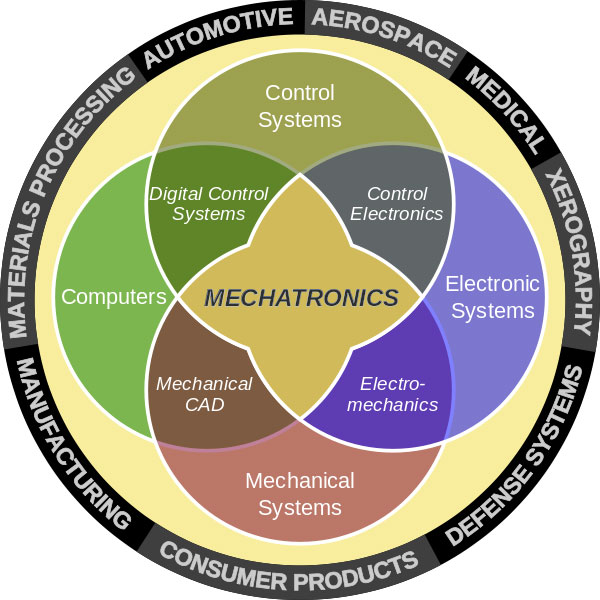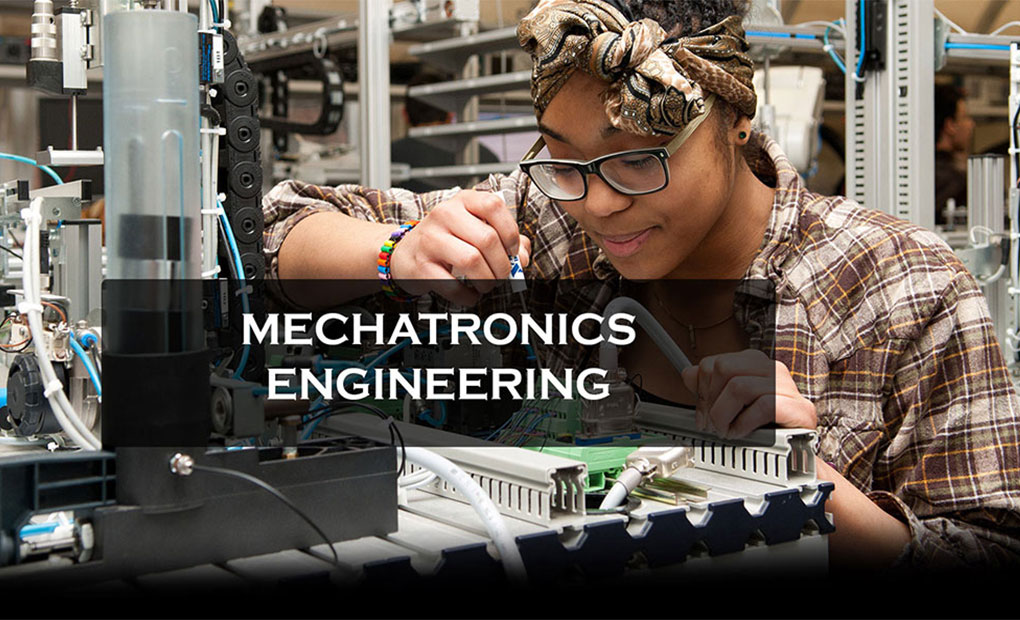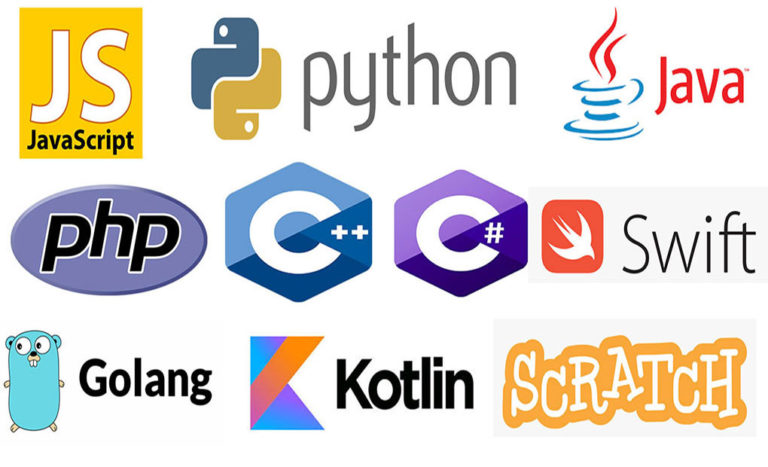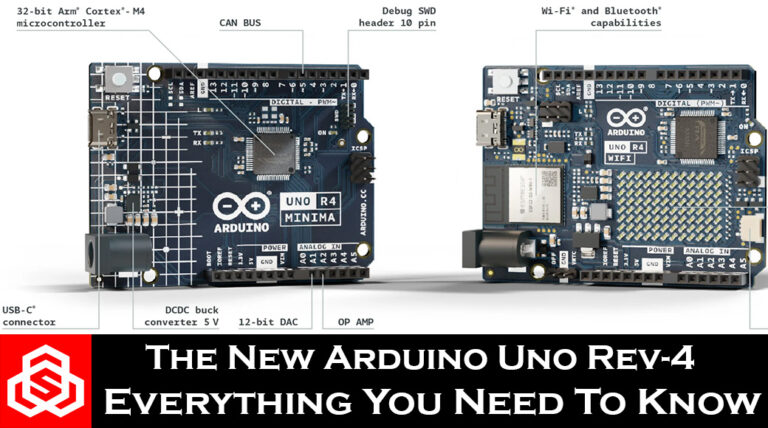Top 10 Reasons for studying Mechatronics Engineering…
Mechatronics Engineering or simply Mechatronics is a branch of engineering that combines/integrates multiple engineering disciplines such as Mechanical Engineering systems, Electrical/Electronic Engineering systems, Computer Engineering systems and Control/Automation Systems as depicted in the structure below.

Image Source: https://eng.rpi.edu/
The term “Mechatronics” was first coined by a Japanese Engineer Tetsuro Mori in 1969 and it was originally intended to be a combination of “Mechanics” and “Electronics” but it has been broadened to include more technical areas due to the continuous evolution of complex technical/engineering systems.
Below are the top 10 reasons why we think you should pursue a degree course in Mechatronics Engineering…
- It’s Multidisciplinary;
With this degree it’s like you are graduating with three or four engineering technology degrees combined in one and the multidisciplinary skills and knowledge you will have obtained will give you a solid base that is needed by any engineer to solve complex engineering problems.
- It’s relatively new and less saturated;
Unlike other Engineering branches that have been taught at different Universities for quite some time now, Mechatronics Engineering is a relatively new field that is currently being offered by a few Universities/Colleges. This means that the number of graduates from this program coming out of Universities every year will be less as compared to other engineering fields which in turn literally means that the job market saturation level is not yet high (saturated) for the mechatronics field. It is also important to note that this field is one of the fastest developing fields with new areas of applications and opportunities being introduced quickly.
- Numerous areas of applications;
Many engineering branches have lesser areas of applications as compared to Mechatronics Engineering that has a wide area of applications which is helpful to graduates. Some of these sub-fields include; Bio-medical systems, Robotics, Nanotechnology, Automation, Mechanical, Electrical and Computer systems.
- Versatility;
Mechatronics offers a wide range of applications which ensures that Mechatronics graduates will always remain versatile enabling them to build a career in any of the above mentioned applications something that other engineering graduates don’t get to enjoy. The fact that graduates from this field acquire multiple technical skills and varied knowledge in a number of applications in a more versatile way, this gives them an edge over other engineering graduates in the job market.
- Ability to specialize in high tech fields;
With a Mechatronics degree, graduates can easily take up a post graduate course and specialize in a particular high tech discipline such as Robotics, Artificial Intelligence, Nanotechnology and Bio-mechatronics. These fields are developing at a rather rapid pace and there are so many innovations springing up as a result of the research and development associated with them.
- High-Impact Jobs;
Graduates from disciplines such as Artificial Intelligence, Nanotechnology, Robotics, Bio-mechatronics and Automation are being sought for worldwide. Jobs in the mechatronics fields are expected to rapidly grow in the next 10 years and so is the demand for qualified professional workforce to take on the jobs available in developed countries. It’s is also important to note however that the salary packages accompanying these mechatronics jobs are or will be lucrative.
- Hands-on Labs;
The Mechatronics Engineering discipline is typically hands-on which means students of this discipline will by all means put theory into practice in state-of-the-art laboratories since most Universities offering this course are well equipped. This will give students the ability to work with the same systems and technologies applied by professionals in the real world giving them the experience and confidence they need. This means graduates from this field will require less on-the-job training as compared to other engineering graduates.
- Applicable Skills;
As a mechatronics engineering student, you will not only learn the theory of how things work or how they are built but you’ll learn how to build, repair, program and maintain smart mechatronic systems yourself and also how to solve real world complex engineering problems, the skills high-tech employers look out for.
- Internships;
Internships are often times designed to provide practical work experience giving students a chance to solve real-world problems in a dynamic environment which in turn yields possible job opportunities upon graduation. As a mechatronics engineering student, you will have the opportunity to find internship opportunities in any of your desired choice of applications with the industry or government organizations that best matches your goals for employment.
- A resume that stands out;
Mechatronics Engineering as a discipline gives a student a combination of comprehensive technical courses, extensive hands-on lab-work and great internship opportunities to apply the obtained knowledge and skills to solve real-world problems which makes a graduate from this field a competitive candidate for the top mechatronics jobs in the tech job market.
The popular core courses that a student is required to undertake while pursing a Mechatronics Engineering degree (BSc / MSc) include but not limited to the following;
1. Engineering Mathematics
- Mechatronics engineering being a multidisciplinary field that combines mechanical, electrical, and computer engineering. In order to design, analyze, and optimize mechatronics systems, engineers need to have a strong foundation in mathematics.
- Engineering mathematics teaches students how to apply mathematical concepts to real-world problems. This includes topics such as calculus, differential equations, linear algebra, and statistics. By learning how to apply these concepts, students can develop the problem-solving skills that are essential for mechatronics engineers.
- Engineering mathematics provides students with the tools they need to work with complex mechatronics systems. These systems often involve interacting components that must be modeled and analyzed mathematically. By understanding the mathematical principles behind these systems, engineers can design and optimize them more effectively.
- Engineering mathematics helps students to think critically and creatively. The ability to think critically and creatively is essential for engineers, as they are often faced with complex problems that require innovative solutions. Engineering mathematics can help students to develop these skills by teaching them how to analyze problems and identify potential solutions.
2. Computer programming
- Computer programming is essential for mechatronics engineers. Mechatronics engineers work with a wide range of electronic and mechanical systems, many of which are controlled by software. In order to design, test, and maintain these systems, engineers need to have a basic understanding of computer programming.
- Computer programming can help mechatronics engineers to automate tasks. By automating tasks, engineers can save time and improve efficiency. This is especially important in the mechatronics field, where engineers often work on complex projects with tight deadlines.
- Computer programming can help mechatronics engineers to create new products and applications. By creating their own software, engineers can add new features and functionality to existing products or create entirely new products. This can lead to new business opportunities and increased profits.
- Computer programming can help mechatronics engineers to communicate with other engineers and technicians. In the mechatronics field, engineers often need to work with other engineers and technicians from different disciplines. By knowing how to program, engineers can communicate their ideas and designs in a way that is understood by everyone involved in the project.
3. Analog and Digital Electronics
- Mechatronics systems combine mechanical, electrical, and computer engineering principles. Analog and digital electronics are the foundation of electrical engineering, and they are essential for understanding and designing mechatronic systems.
- Analog and digital electronics are used in a wide variety of mechatronic systems. Examples of mechatronic systems that use analog and digital electronics include robots, medical devices, and industrial automation systems. By understanding analog and digital electronics, mechatronics engineers can design and troubleshoot these systems.
- New technologies in analog and digital electronics are emerging all the time. By taking an Analog and Digital Electronics course unit, mechatronics engineering students can stay up-to-date on the latest technologies and how they can be used to design and improve mechatronic systems.
- Learning about analog and digital electronics can be challenging, but it is also rewarding. By mastering these subjects, mechatronics engineering students can develop the skills and knowledge they need to succeed in their careers.
4. Embedded Systems
- An understanding of embedded systems is essential for mechatronics engineers who want to design, develop, and test these systems. Embedded systems course units typically cover topics such as microcontrollers, microprocessors, programming languages, and real-time operating systems.
- Taking an embedded systems course unit can help mechatronics engineering students to develop the skills they need to work in this growing field. These skills include: Programming skills, Hardware design skills, Systems analysis skills, Problem-solving skills
- An embedded systems course unit can also help mechatronics engineering students to network with other students and professionals in this field. This can be helpful for finding internships, jobs, and research opportunities.
5. Computational Methods
- Computational methods are essential for mechatronics engineers. Mechatronics systems are often complex and involve interacting components. Computational methods can be used to model and simulate these systems, which can help engineers to design, analyze, and optimize them.
- Computational methods can help mechatronics engineers to save time and money. By using computational methods, engineers can avoid the need to build and test physical prototypes. This can save time and money, and it can also help engineers to identify potential problems with a design before it is actually built.
- Computational methods can help mechatronics engineers to work more efficiently. By automating repetitive tasks, computational methods can help engineers to focus on more creative and strategic work. This can lead to better designs and solutions.
6. Dynamics
- Dynamics is the study of how objects move and how forces affect their motion. This is a fundamental concept in mechatronics engineering, as mechatronic systems often involve moving parts.
- A strong understanding of dynamics is essential for designing, analyzing, and optimizing mechatronic systems. For example, engineers need to understand how forces affect the motion of a robotic arm in order to design an arm that can perform a specific task.
- Dynamics is also important for understanding how mechatronic systems interact with their environment. For example, engineers need to understand how the motion of a car will be affected by the wind in order to design a car that is safe and stable.
7. Thermofluids
- Thermofluids provides mechatronics engineers with the knowledge and skills they need to design, analyze, and optimize mechatronic systems. For example, thermofluids can be used to design cooling systems for electronic components, optimize the efficiency of engines, and predict the performance of robots.
- Thermofluids is a multidisciplinary field that draws on concepts from physics, chemistry, and mathematics. This makes it a valuable addition to the education of mechatronics engineers, who need to be able to understand and apply concepts from a variety of disciplines.
- Thermofluids is a challenging but rewarding course that can help mechatronics engineers to develop their problem-solving and analytical skills. It can also help them to gain a deeper understanding of the physical world and the principles that govern the behavior of mechatronic systems.
8. Material Engineering
- The properties of materials, such as strength, stiffness, conductivity, and bio-compatibility, have a significant impact on the performance of mechatronic systems. By understanding the principles of materials engineering, mechatronics engineers can select the right materials for their applications and design systems that are reliable and efficient.
- Material engineering can help mechatronics engineers to improve the sustainability of their designs. By selecting materials that are recyclable or biodegradable, mechatronics engineers can help to reduce the environmental impact of their products.
- Material engineering can help mechatronics engineers to create products that are more user-friendly and comfortable. By understanding the properties of different materials, mechatronics engineers can design products that are ergonomic and safe to use.
9. Signals & Systems
- Signals & Systems is a fundamental course in mechatronics engineering. It provides students with the foundation they need to understand how signals are processed and controlled in mechatronic systems.
- Signals & Systems is used in a wide variety of mechatronic applications. For example, it is used in control systems, robotics, and sensor networks.
- Signals & Systems is a challenging course, but it is also very rewarding. By taking this course, students will gain a deeper understanding of the underlying principles of mechatronics engineering.
- Signals & Systems is a prerequisite for many other advanced courses in mechatronics engineering. By taking this course, students will be well-prepared for further study in this field.
10. Advanced Communication Systems
- Many mechatronic systems rely on communication systems to transmit data between different components. For example, a robotic arm may use a communication system to send signals from its sensors to its motors.
- Advanced communication systems are becoming increasingly important. The demand for advanced communication systems is growing as more and more mechatronic systems are being developed. For example, self-driving cars rely on advanced communication systems to communicate with each other and with traffic infrastructure.
- Taking an Advanced Communication Systems course unit can help mechatronics engineering students to stay up-to-date on the latest advances in communication technology.
11. Robotics
- The demand for robotics engineers is expected to grow in the coming years, as robots are increasingly used in a variety of industries, such as manufacturing, healthcare, and transportation.
- Taking a robotics course will give you the skills and knowledge you need to work in this exciting field. You will learn about the different types of robots, how they are designed and controlled, and how they are used in real-world applications.
- A robotics course will also help you to develop your problem-solving and analytical skills. You will need to be able to think critically and creatively in order to design and troubleshoot robots.
- Taking a robotics course will give you the opportunity to work on hands-on projects. This will allow you to gain practical experience with robotics and to develop your technical skills.
12. Internet of Things
- IoT is a rapidly growing field with many potential applications in mechatronics. IoT devices are used in a wide variety of industries, including manufacturing, healthcare, transportation, and energy. As the IoT market continues to grow, there will be a high demand for mechatronics engineers who are skilled in IoT design and development.
- An IoT course unit can help mechatronics engineering students to develop the skills they need to work with IoT devices. These skills include; Programming skills, Networking skills, Data analytics skills, and Security skills.
- An IoT course unit can also help mechatronics engineering students to understand the impact of IoT on the future of mechatronics. IoT is changing the way that mechatronics systems are designed, developed, and used. By understanding the impact of IoT, mechatronics engineers can be better prepared to design and develop the next generation of mechatronic systems.
13. Statics & Solid Mechanics
- Statics is the study of forces and how they affect objects in equilibrium. This is important for mechatronics engineers because they need to be able to analyze the forces that act on mechatronic systems in order to ensure that they are safe and reliable.
- Solid mechanics is the study of the behavior of materials under stress and strain. This is important for mechatronics engineers because they need to be able to understand how the materials used in mechatronic systems will deform and fail under different loading conditions.
- Both statics and solid mechanics are essential for mechatronics engineers who want to design, analyze, and maintain mechatronic systems. By taking these courses, students will gain a strong foundation in the fundamental principles of mechanics that are essential for a successful career in mechatronics engineering.
14. Control Systems & Optimal Control
- Control systems are essential for mechatronic systems. Mechatronic systems are typically complex and dynamic, and they often require feedback control to ensure that they operate as intended. By understanding the principles of control systems, mechatronics engineers can design and implement control systems that improve the performance and reliability of their systems.
- Optimal control is a powerful tool for mechatronics engineers. Optimal control techniques can be used to find the best way to control a system, given a set of constraints. This can be useful for mechatronics engineers who need to optimize the performance of their systems, or who need to ensure that their systems operate safely and reliably.
15. Data Analysis & Machine Learning
- Data analysis and machine learning are becoming increasingly important in mechatronics engineering. As mechatronic systems become more complex, engineers need to be able to collect and analyze large amounts of data in order to make informed decisions about their design and operation.
- Data analysis and machine learning can be used to improve the performance of mechatronic systems. For example, machine learning can be used to develop algorithms that can automatically control mechatronic systems or to predict when a system is likely to fail.
- Data analysis and machine learning can be used to develop new mechatronic products and services. For example, data analysis can be used to identify new market opportunities or to develop new ways to improve the user experience of mechatronic products.
16. Manufacturing Processes
- Manufacturing Processes is a foundational course for mechatronics engineers. It provides students with the knowledge and skills they need to understand and work with manufacturing processes, which are essential for the design, development, and production of mechatronic systems.
- Manufacturing Processes covers a wide range of topics, including:
- Basic manufacturing operations, such as casting, forging, machining, and welding
- Manufacturing materials, such as metals, plastics, and composites
- Manufacturing equipment and machinery
- Manufacturing quality control and assurance
- Manufacturing Processes is a hands-on course, which means that students will have the opportunity to learn by doing. This includes working with actual manufacturing equipment and machinery, as well as conducting experiments and simulations.
- Manufacturing Processes is a valuable course for mechatronics engineers, as it provides them with the knowledge and skills they need to work in a variety of manufacturing industries.
17. Process Engineering
- Mechatronics engineers often work on the design, development, and implementation of manufacturing processes. In order to do this effectively, they need to have a good understanding of process engineering principles.
- Process engineering teaches students how to design and optimize manufacturing processes. This includes topics such as process flow analysis, material handling, and quality control. By learning these concepts, students can develop the skills they need to design and improve manufacturing processes.
- Process engineering provides students with a broad understanding of manufacturing. This includes knowledge of the different types of manufacturing processes, the equipment used in these processes, and the materials that are processed. By understanding these aspects of manufacturing, students can better understand the challenges and opportunities that exist in this field.
18. Energy Systems & Mobility
- The demand for energy-efficient and sustainable transportation systems is increasing, and mechatronics engineers are in high demand to design and develop these systems.
- The course teaches students about the latest technologies in energy and mobility. This includes topics such as electric vehicles, renewable energy, and smart transportation systems.
- The course gives students hands-on experience with energy systems and mobility technologies. This includes lab work and projects that allow students to apply the concepts they learn in the classroom.
- The course helps students develop the skills they need to work in the energy and mobility industry. This includes skills in systems engineering, control engineering, and electrical engineering.
19. Renewable Energy Technologies
- The demand for renewable energy engineers is expected to grow significantly in the coming years, as more and more people and businesses look to switch to sustainable energy sources.
- Renewable energy technologies are interdisciplinary in nature, which makes them a good fit for mechatronics engineers. Mechatronics engineers have a strong foundation in mechanical, electrical, and computer engineering, which are all essential skills for working in the renewable energy field.
- Taking a Renewable Energy Technologies course unit will give mechatronics engineering students the knowledge and skills they need to work on cutting-edge renewable energy projects. This includes topics such as solar, wind, hydro, and geothermal energy.
20. Technology Innovation
- Technology Innovation course unit can help students to stay up-to-date on the latest technological trends. This includes topics such as artificial intelligence, robotics, and 3D printing. By learning about these technologies, students can develop the skills they need to design and develop innovative mechatronic systems.
- Technology Innovation course unit can help students to develop their problem-solving skills. Mechatronics engineers are often faced with complex problems that require innovative solutions. Technology Innovation course unit can help students to develop these skills by teaching them how to identify and solve problems using new technologies.
21. System Identification & Modelling
- This course teaches students how to model and identify the dynamic behavior of mechatronic systems. This is essential for the design, analysis, and control of mechatronic systems.
- The course draws on concepts from mathematics, physics, and engineering. This makes it a valuable course for mechatronics engineering students, who need to be familiar with a wide range of disciplines.
- It also teaches students how to use software tools to model and identify mechatronic systems. This allows students to apply the concepts they learn in the course to real-world problems.
22. Sustainable Engineering
- As the world becomes more aware of the need to protect the environment, there is a growing demand for engineers who can design and implement sustainable solutions.
- Sustainable engineering can help mechatronics engineers to create more efficient and environmentally friendly products. By incorporating sustainable design principles into their work, mechatronics engineers can help to reduce the environmental impact of their products.
- Taking a sustainable engineering course can help mechatronics engineers to develop the skills they need to work in this growing field. These skills may include:
- Knowledge of environmental impact assessment and life cycle analysis
- Skills in sustainable design and manufacturing
- Knowledge of renewable energy and energy efficiency
- Skills in environmental policy and regulation
23. Internship Training
- Internship training provides students with practical experience in the field of mechatronics engineering. This is essential for mechatronics engineering students, as it allows them to apply the knowledge and skills they have learned in the classroom to real-world projects.
- Internship training gives students the opportunity to network with professionals in the mechatronics engineering field. This can help students to make connections that can lead to job opportunities after graduation.
- Internship training can help students to develop their soft skills, such as communication, teamwork, and problem-solving. These skills are essential for success in any engineering career.
- Internship training can help students to decide if a career in mechatronics engineering is right for them. By working in a mechatronics engineering internship, students can get a taste of what the job is like and see if it is a good fit for their interests and skills.
24. BSc / MSc Thesis or Project
- A thesis or project is a research-intensive undertaking that requires students to identify a problem, conduct research, and develop a solution. This process can help students to develop their research skills, such as literature review, data analysis, and writing.
- In addition to research, a thesis or project often involves hands-on work, such as building prototypes or conducting experiments. This experience can help students to develop their technical skills and learn how to apply their knowledge in a real-world setting.
- Working on a thesis or project gives a student the opportunity to interact with other students, professors, and industry professionals. This networking can be invaluable for your future career, as it can help you to find mentors, learn about job opportunities, and make connections.
- A thesis or project can be a valuable addition to your resume, as it shows employers that you have research and technical skills. This can give you an edge over other job applicants and help you to land your dream job.
Conclusion:
A Mechatronics Engineering degree at either Undergraduate/Postgraduate level can be somewhat expensive if you have limited financial resources or if you’ve failed to secure a scholarship. If you are in such a situation then worry not because we’ve got you covered, we have created free easy to follow project-tutorials (text & video) in the fields of Mechatronics and Artificial Intelligence that you can follow along and learn this discipline on your own in the comfort of your home.









